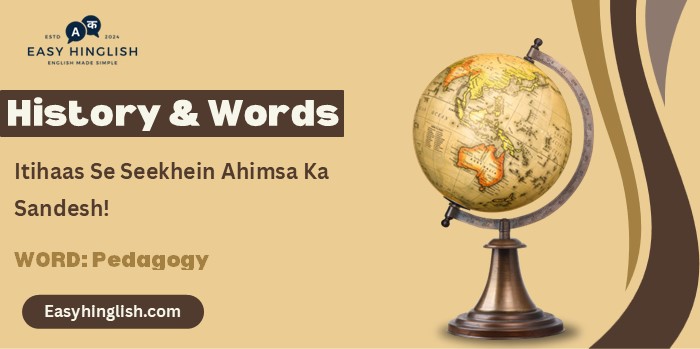History & Words: 'Pedagogy' (December 30)
Swagat hai 'History & Words' mein. 🌟 Main Prashant hoon, Wordpandit aur Learning Inc. Network ka sansthapak. Yeh series meri bhasha seekhne ki lagan aur itihas ke prati ruchi ka sangam hai. Har kadi ek shabd aur uss se judi ek tithi par roshni daalti hai, jisse aapka shabdkosh badhta hai aur aap itihas ko gehraai se samajh paate hain. Aaiye, iss safar mein shabdon ke madhyam se samay mein pichhe chalein.
📚 Table of Contents
🔍 Aaj ka Shabd: Pedagogy
Pronunciation: /ˈpɛdəɡɒdʒi/ (PED-uh-goj-ee)
🌍 Parichay (Introduction)
30 December 1916 ko Grigory Rasputin ka assassination hua - ek controversial figure jisne Russian royal family ki education par significant influence dala tha. Rasputin ki death ne traditional pedagogical practices aur political power ke dangerous intersection ko highlight kiya.
Rasputin ne Tsarevich Alexei aur royal children ki education mein direct involvement ki thi, often conventional tutoring methods ko challenge karte hue. Unki unconventional approach ne aristocratic education system ko question mark pe khada kar diya tha.
Pedagogy sirf teaching method nahi - yeh power, politics, aur social transformation ka tool hai. 30 December 1916 ka din remind karta hai ki educational influence kitni dangerous ho sakti hai jab personal agenda aur institutional power mix ho jaayein. Rasputin ki death ke saath old Russian educational traditions ka ek era bhi end ho gaya.
🌱 Shabd ka Utpatti (Etymology)
"Pedagogy" ka origin ancient Greek mein hai:
- "Paidagogos" - "paidos" (child) + "agogos" (leader/guide)
- Originally "paidagogos" wo slave hota tha jo wealthy Greek families mein children ko school le jaata tha aur unki care karta tha
Roman times mein yeh concept "paedagogus" ban gaya. Medieval period mein Latin scholars ne isse "pedagogia" kaha, jo teaching ki art aur science ko refer karta tha.
Renaissance se modern times tak, pedagogy formal education methodology ka synonym ban gaya, lekin original Greek meaning mein guidance aur mentorship ka broader concept tha.
📖 Mahatvapurn Shabdavali (Key Vocabulary)
- 🔑 Didactics: Teaching methodology ka systematic study
- 🔑 Curriculum: Educational program ka structured content
- 🔑 Andragogy: Adult learning ka pedagogy
- 🔑 Constructivism: Students apna knowledge construct karte hain
- 🔑 Scaffolding: Temporary support structure for learning
- 🔑 Differentiated Instruction: Individual learning needs ke according teaching
🏛️ Itihasik Sandarbh (Historical Context)
Pedagogy ka evolution human civilization ke saath parallel chalta raha hai. Ancient Greece mein Socratic method - questioning through dialogue - establish hui. Plato ka Academy aur Aristotle ka Lyceum formal pedagogical institutions the.
Medieval Europe mein Church-controlled education dominant thi. Scholastic method - logic aur theology ko combine karna - main pedagogical approach thi. University system 12th century mein develop hui.
Renaissance period mein humanism ne education ko transform kiya. Comenius (17th century) ne visual learning aur child-centered approach introduce kiya. Rousseau (18th century) ne argue kiya ki "education should be natural".
19th century mein Pestalozzi, Froebel, aur Herbart ne modern pedagogical theories develop kiye. Industrial Revolution ne mass education systems ki need create ki.
Rasputin ke time (early 20th century) mein progressive education movement start ho rahi thi. Maria Montessori, John Dewey jaise educators traditional teacher-centered methods ko challenge kar rahe the.

⏳ Samayrekha (Timeline)
- 399 BC: Socrates ki death, Socratic method ka legacy
- 387 BC: Plato ka Academy establishment
- 1088: University of Bologna, first European university
- 1658: Comenius ka "Orbis Pictus", first illustrated textbook
- 1762: Rousseau ka "Emile", natural education theory
- 1837: Froebel ka first kindergarten
- 1907: Montessori ka first Casa dei Bambini
- 30 Dec 1916: Rasputin's assassination, end of his educational influence
- 1917: Russian Revolution, complete educational system overhaul
🌟 Is Din ka Mahatva (The Day's Significance)
30 December 1916 ko Rasputin ki death ne Russian royal education ka ek controversial chapter close kiya. Rasputin ne Tsarevich Alexei ke hemophilia treatment ke bahane royal family ki educational decisions mein interference kiya tha.
Rasputin ka educational influence unconventional tha - woh mysticism, religious instruction, aur practical life skills ko mix karta tha. Traditional French tutors aur classical education ke against, usne Russian Orthodox spirituality aur peasant wisdom ko promote kiya.
Royal children ko "real Russia" se connect karne ke liye Rasputin folk stories, religious tales, aur practical skills sikhata tha. Yeh approach aristocratic educational norms ke completely against thi.
Rasputin ki death ke immediately after, World War I pressures aur revolutionary sentiments ne Russian educational system ko completely destabilize kar diya. 1917 Revolution ne class-based education ko communist pedagogical principles se replace kar diya.
Pedagogical perspective se yeh din important hai kyunki yeh show karta hai ki individual influence educational systems ko kis tarah manipulate kar sakti hai, especially jab political power involved ho.
💬 Prasiddh Ukti (Quote)
"The best teachers are those who show you where to look, but don't tell you what to see."
— Alexandra K. Trenfor
🔮 Aaj Ka Malta aur Chintan (Modern Usage and Reflection)
Aaj pedagogy technology-enhanced learning aur personalized education ka era hai. AI-powered adaptive learning, virtual reality classrooms, aur global connectivity ne traditional teaching boundaries tod diye hain.
Modern pedagogical approaches mein collaborative learning, project-based education, aur competency-based assessment include hain. COVID-19 pandemic ne remote pedagogy aur hybrid learning models ko mainstream bana diya.
Critical pedagogy - Paulo Freire ka concept - education ko social justice tool ke roop mein use karta hai. Yeh power dynamics aur educational equity par focus karta hai.
🏛️ Virast (Legacy)
Rasputin case se pedagogy ka dark side clear hota hai - educational influence ko personal agenda aur political manipulation ke liye use kiya ja sakta hai. Modern educational systems mein checks and balances isi reason se important hain.
Democratic pedagogical principles - transparency, accountability, aur professional standards - aise individual dominance ko prevent karte hain. Teacher training, curriculum oversight, aur educational governance essential safeguards hain.
Progressive education movement jo Rasputin ke time start hui thi, aaj student-centered learning ka foundation hai.
🔍 Tulnatmak Vishleshan (Comparative Analysis)
Rasputin ke time individual tutor system mein unaccountable influence possible tha, aaj institutional frameworks aur professional standards se educational quality ensure hoti hai.
Pehle religious aur political indoctrination common tha education mein, aaj critical thinking aur secular pedagogy ko promote kiya jaata hai. Evidence-based teaching methods ne superstition aur personal bias ko reduce kiya hai.
Technology ne democratized access create kiya hai - ab quality education sirf wealthy elites tak limited nahi hai.
💡 Kya Aapko Pata Hai? (Did You Know?)
🎓 Antim Vichar (Conclusion)
Pedagogy neutral tool nahi hai - yeh power, ideology, aur social change ka medium hai. 30 December 1916 ko Rasputin ki death ne educational influence ki dangerous potential ko highlight kiya.
Aaj bhi har classroom mein teacher ki responsibility hai ki woh ethical pedagogy practice kare aur students ko critical thinking sikhaye, not just blind obedience. Good pedagogy empowers learners, manipulative pedagogy controls them.
📚 Aage Padhne ke Liye (Further Reading)
- 📘 Pedagogy of the Oppressed - Paulo Freire
- 📗 The Schools We Need and Why We Don't Have Them - E.D. Hirsch Jr.
- 📙 Rasputin: The Biography - Douglas Smith








